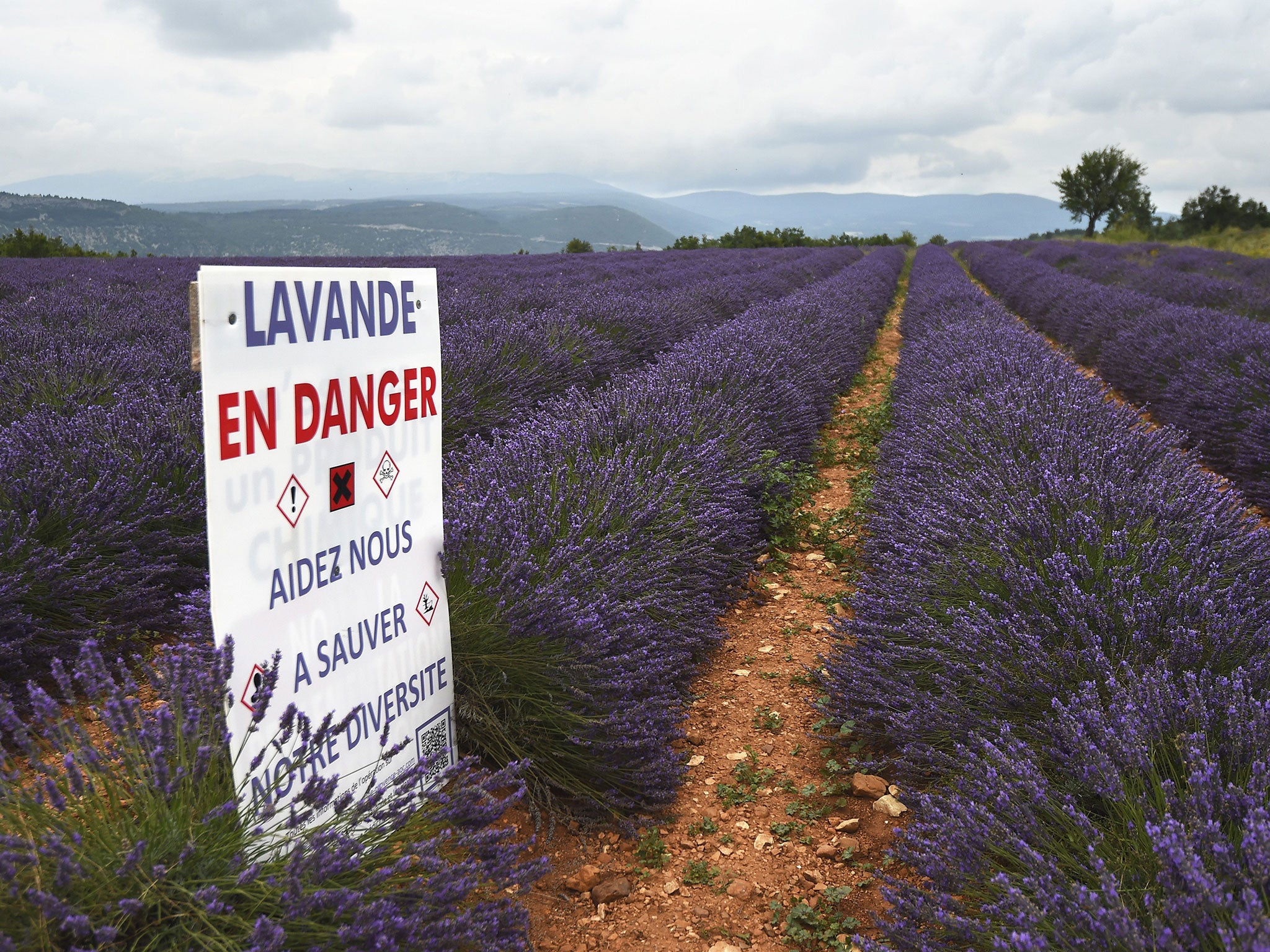Lavender farmers of Provence turn purple with rage at EU health rules warning
Perfumes and soaps using plant’s oil will have to carry ‘fatal if swallowed’ warning label

Your support helps us to tell the story
From reproductive rights to climate change to Big Tech, The Independent is on the ground when the story is developing. Whether it's investigating the financials of Elon Musk's pro-Trump PAC or producing our latest documentary, 'The A Word', which shines a light on the American women fighting for reproductive rights, we know how important it is to parse out the facts from the messaging.
At such a critical moment in US history, we need reporters on the ground. Your donation allows us to keep sending journalists to speak to both sides of the story.
The Independent is trusted by Americans across the entire political spectrum. And unlike many other quality news outlets, we choose not to lock Americans out of our reporting and analysis with paywalls. We believe quality journalism should be available to everyone, paid for by those who can afford it.
Your support makes all the difference.The sweet smell of lavender is tinged with bitterness this year in the south of France, as farmers who harvest the flower protest at European regulations linking the plant to chemical toxins.
Posters proclaiming “Lavender is not a chemical” dot fields that yield what in Provence is known as blue gold – lavender oil, worth over £80 a kilogram. The plant is cultivated by around 1,500 producers, representing 30,000 full-time jobs that include catering to the millions of tourists who come for those panoramic views of purple fields.
For many, Provence is synonymous with lavender, both fine lavender – used for perfumes, cosmetics and aromatherapy – and hybrid lavender, called lavandin. Lavandin is cheapest and used to scent soaps, detergents and air fresheners.
And they fear EU rules, adopted last year and due to come into force by 2018, will threaten that. According to regulators, lavender oil’s potential to produce allergies places it firmly within regulations on chemical toxins. That means lavender products will have to bear bold black-and- red warning labels, with messages such as “Can be fatal if swallowed or inhaled.”
Producers say the rules are too extreme – they note that lavender oil allergies usually produce only rashes – and too expensive for small farmers.
Lavender producers are now fighting “to survive”, said Francis Vidal, president of the Apal, an association representing the huile essentielle de lavande producers. As well as the posters, the group has organised an online petition, signed by more than 15,000 people.
“The consequence of this ruling, in the very short term, would be the ruin of our plantations and the disappearance of lavender from our Provençal countryside,” the Apal explained in a letter to President François Hollande and other politicians.
Advocates point out that lavender oil was used as an antiseptic until the beginning of the 20th century. Even today it is prized for its healing and calming properties. “Lavender has been used for thousands of years,” Mr Vidal said. “We never heard of any serious problems. Instead, we know lavender oil helped save tens of thousands human lives.”
Even the European Commission acknowledges that any substance whose contents depend on the amount of sun it receives and the kind of soil it springs from is difficult to classify as a chemical product.
“Natural substances whose composition is variable require more effort and expertise in order to be registered compared to ‘classical’ industrial chemicals. Other products subject to natural variations, like wine for example, aren’t covered by the chemicals directive but are governed by the relevant food safety and sanitary rules,” the Commission has said in a document provided to AP.
EU authorities met the lavender producers in April and are now working on ways to help them conform to the law. Proposals are to be made this autumn, according to the Commission document.
But producers claim lavender oil should simply be reclassified under agricultural products.
French producers don’t oppose mentioning a potential allergy risk on their product, Mr Vidal said, but they are adamantly against the kinds of dire warnings that can be found on chemicals used in industrial processes, such as hydrochloric acid or cleaning products.
“There is a risk being linked to a chemical, and [this] can lead to confusion for consumers,” said Emilie Zamora, head of communication for the PPAM, the professional producers of perfume union.
In addition, lavender farmers would themselves be responsible for carrying out the chemical analysis. Many are small farmers who couldn’t afford the expensive procedure, Mr Vidal said.
The farmers have received support from Raymond Chaillan, a French perfume creator whose nose helped create the scents for Opium, Anaïs Anaïs and Parfum d’Hermès.
“This new directive will foreshadow the death of the plantations of lavender, of hybrid lavender, and the sage from the south-east of France, this agriculture of the dry mountains,” Ms Chaillan wrote in a statement to support lavender producers. “It will further reduce the perfumers’ palette, limiting their creativity.”
AP
Join our commenting forum
Join thought-provoking conversations, follow other Independent readers and see their replies
Comments